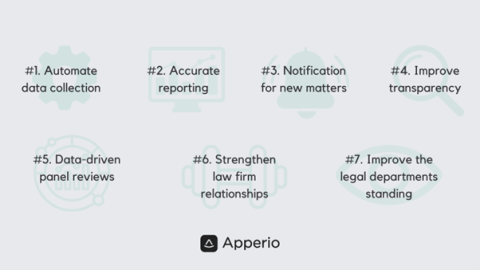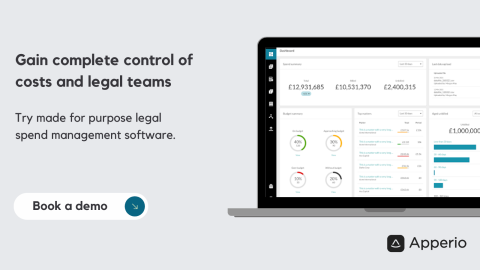Benefits of legal spend management for 2025

Legal spend management is modernizing how in-house legal teams and law firms handle billing and budget conversations. The benefits legal spend management brings include transparency and objectivity, enabling lawyers to focus on what matters most: practising law.
Here we go again.
Large law firms are planning “the largest rate hikes on record next year.” That finding is from a recent survey by the Wells Fargo Legal Specialty Group as reported by Law.
Yet “legal departments say they're in a financial squeeze and can't absorb big increases,” according to Corporate Counsel. Many in-house lawyers are reportedly “surprised, angry and dismayed” at the proposed rate hikes and plan to “fight” the increases.
They seem to be making quick work of that vow too:
“Law firms are seeing longer delays in payments from their clients, amidst a slow-down in [M&A] deals and changes in corporate billing departments,” said the American Lawyer in another report. It cited data from the Global Wealth at Work Law Firm Group by Citi.
Both sides dislike these uncomfortable conversations
None of this is new and we see a similar story year after year. Sure, there are different angles and subtleties, but the subplot is always the same.
There’s usually one detail that goes unnoticed in the ruckus: lawyers on both sides of the aisle dislike these uncomfortable conversations. Further, many of the existing solutions – demanding discounts, challenging line items or rejecting invoices – are divisive. Perhaps worst of all, it’s a distraction from the important duty lawyers have of mitigating risk.
There is a better way–and it lies in understanding the key benefits legal spend management provides.
It starts with market leading technology that removes the opacity around legal billing – and puts clients and law firms on a level negotiating field. That technology is called legal spend management software.
7 key benefits of legal spend management software in 2025
Typically, (but not always) it’s the client side that procures Apperio and uses it to collect the latest legal spend data from the practice management systems used by their law firms. It pulls together all the spending data around their matters, across all their law firms and puts it on a single screen. This allows clients to see the live status of all matters and budgets across their organization in one place.
Obtaining this comprehensive view of legal spending, as the work takes place, is one of the most significant benefits of the software. Below is a list of other legal spend management benefits we hear from the market.

1. Continuously monitor legal spend.
Businesses often struggle with the tedious task of manually collecting spend data, in particular accruals and reconciling the formats. They’ll get reports in spreadsheets, presentations, PDFs and email, for example. It takes a lot of effort to get all the data into a format that’s usable for tracking spend. The manual process means it's error-prone and slow – in the case of accruals the data will always be out of date.
Apperio does this all automatically. Our software continuously monitors legal spend, meaning the only thing that’s left to do is customize your dashboard to display the information how you’d like it. Law firms get a dashboard too for the matters they are working on, seeing the same data their clients see. This puts clients and service providers on the same page, enhancing collaboration.
EQT, one of the world’s largest investment organizations, found Apperio eliminated about 90% of the back-and-forth emails it used to take to chase down spend data.
This benefits law firms too: it eliminates the back-office scramble involved in pulling together a status update in response to a client inquiry.
"It made all our financial information a lot more accurate - Before Apperio we would send out a spreadsheet to see spend, often with very approximate amounts." Suzanne Joynes, Cost accountant at Marex.
2. Accurately report and forecast law department spending.
It’s relatively straightforward to report and forecast spending because all the legal spend data is in one place and you have the ability to continuously monitor spend. No more surprises. Since the data is current, corporate counsel always knows exactly where they are on budget – they have the most accurate view.
If finance wants to know what the business spent on legal services last week, last month, last quarter or last year, that information is a click away. If they want to know what accruals to forecast, they can see their law firm’s work-in-progress (WIP) and accruals, with full accuracy as the data is taken from the actual time entries in the law firm’s time and billing system. This allows them to accurately forecast accruals and budgets often gaining praise from auditors and elevating the legal and finance team’s relationships.
This benefits law firms too because the client is never surprised by an invoice. Even better, they’ve been following the progress all along, which means the invoice review and approval process becomes a mere formality – resulting in law firms getting paid faster.
As the client begins to collect data, over time, they can see trends in spending by firm and matter type for example. This historical data makes it much easier to forecast legal expenses for the next quarter, or the next year – and it’s all based on historical spending and not a gut feeling.
3. Stay informed with notifications for new matters outside the legal department.
Some of the challenges around managing legal spend has less to do with an organization’s external spending and more to do with their internal processes and structure. One huge barrier is the decentralized initiation of legal matters: the legal department might even receive an invoice for a matter they never even knew was worked on.
This is pretty common among financial services companies and investment organizations but it happens in other verticals too. For example, we’ve seen it in markets including infrastructure and utilities. These businesses need to move quickly – on investment deals or invoke easement clauses to initiate repairs rapidly – so there are employees outside the legal team who initiate work directly with preferred law firms.
A recent survey of in-house lawyers working for PE and VC firms found 81% said some matters are initiated without their knowledge. One chief legal officer for a PE firm said they find out about new legal matters from investors – outsiders to the internal workings of the business.
Apperio solves this problem because it’s connected to the law firm’s system of record. When a new matter is initiated, it will alert the legal department and allow them to track the matter’s progress and spend. The upside here for law firms is keeping the legal department informed and the lines of communication open, which fosters greater trust with their clients.
The benefit of this particular feature was appealing to the Phoenix Group, the UK’s largest long-term savings and retirement business and a large utilities and infrastructure company.
4. Improve transparency and regulatory compliance with legal spend management software.
A number of our customers enjoy the transparency and audit trail our product provides for regulatory compliance or investor disclosure purposes.
We have many public sector companies, that are regulated and required to account for all spending, including legal. This can’t be a guessing game – or an estimate – they need to report with precision and have a clear audit trail. Our software allows them to do that.
Similarly, private investment funds are facing increased scrutiny from regulators. One managing partner we spoke with noted in his 25 years of experience, his firm has had two unannounced visits from the Securities and Exchange Commission (SEC).
They wanted to know that the firm was applying the same level of rigor to legal expenses charged to a fund – that is investor money – as they were to “house spend” – that is the cost of running a general partnership.
In other words, the SEC investigators said, ‘show me the law firms you work with along with the rates you've paid and the billing terms – and now show it to me for both your house spend and your deal spend.’ The terms and amount paid need to be the same, or the investment firm runs the risk of fines, penalties or worse.
5. Conduct data-driven law firm panel reviews.
Network Rail used the data in Apperio to right-size their law firm panel. It took the guesswork out of estimates and drove clear, transparent and competitive bids. The team ended up with a smaller panel doing more of their work – a clear advantage to those law firms that embraced transparency.
“We wanted to keep our panel small, because that way we knew we could build a true long-term partnership with our outside counsel,” said Dan Kayne in a panel discussion. He was a longtime GC at Network Rail and has since turned consultant and founder of the O Shaped Lawyer.
“I believe this is because having a smaller number of firms allows you to have a deeper relationship, built on a genuinely open and transparent arrangement, which includes visibility of spend,” he added.
Marex also used Apperio to help drive their Panel review process which wouldn't have been possible without the rich Apperio data:
Thanks to having all their spend data at their fingertips Marex have embarked on a process to reduce the overall number of Law Firms which Jason says “wouldn’t have been possible without Apperio”.
6. Strengthen law firm relationships.
Many of the software products on the market today – such as e-billing – deliver their value based on invoice rejection. These tools automate the enforcement of billing guidelines. This means it needs an invoice to trigger an action which is reactive (negative), and always once the work has been completed. By contrast, legal spend management is proactive and enables the legal department to get ahead of the invoice, offering the ability to see and review work as it takes place.
More importantly, it can be a frustrating process for law firms that have many clients and need to comply with several different guidelines and e-billing tools. As such, it becomes divisive in a profession that prides itself on relationships and collaboration.
Apperio helps inside and outside counsel build a common operating picture. Conversations about progress and budget are guided by data, which makes the conversations a whole lot more objective. In turn, this builds trust and strengthens the relationships between clients and law firms.
7. Improve the legal department’s standing within the business
Some legal departments struggle to have basic conversations with finance or the C-Suite because they don’t have command over their numbers. We’ve watched as customers have transformed from being incapable of reporting and forecasting their budget, to being a model example for the rest of the business.
Business acumen matters too, as one GC noted in response to a survey by the Association of Corporate Counsel: “Being a good lawyer is a given; it’s the other skills that matter.”
There’s a benefit here for law firms too: every service provider is in some sense defined by the success of their client. In other words, a client’s successes are a law firm’s success.
Jason Vera-Torres, Head of Legal equities and fund at Marex calls Apperio “The Translator” as it helps answer the “why” for legal spend. “A great tool to demonstrate to the CEO, why are we spending money, you see this spend, it’s because of these activities that we want to do as a business. Elevating the value of the legal team. “Helping translate legal value into CEO language.”
A new standard for legal spend management in 2025
As legal departments navigate rising costs, stricter compliance requirements, and growing demand for transparency, legal spend management software is no longer optional—it’s essential. Tools like Apperio empower teams to operate with confidence, reduce administrative burdens, and strengthen relationships with external counsel.
If your team is ready to change the way you manage legal budgets, Apperio offers the solution you need. See how it works by scheduling a live demo today.
Key benefits of legal spend management with Apperio:
- Improve legal spend visibility: Continuously monitor costs as they occur. Prevent budget overruns.
- Automated data collection: Eliminate manual entry. Consolidate information in one dashboard.
- Improved budgeting: Forecast future costs accurately. Analyze spending patterns.
- Enhanced compliance: Provide transparent audit trail. Demonstrate expenditure to regulators.
- Stronger law firm relationships: Build objective billing discussions. Improve communication
- Proactive matter management: Stay informed about new matters. Manage effectively from the start
- Reduced administrative burden: Automate time-consuming tasks. Focus on higher-value work.
- Faster invoice processing: Simplify review and approval. Accelerate payments to firms.
-
Data-driven decisions: Access detailed analytics. Identify cost-saving opportunities.

See it for yourself: The Apperio platform provides in-house legal teams with a proactive approach to managing their legal spend. See for yourself and schedule a live demo by emailing info@apperio.com.
Keen to learn more? Take a look at these blogs:
- Legal tech guide to 2025: 5 innovations to watch
- Closing the gaps in legal spend management before Year-End: Lessons for 2025
- The Private Equity leader's guide to taming legal costs in 2025's deal boom
Frequently Asked Questions
What is legal spend management software?
Legal spend management software is a tool that helps organizations track, analyze, and optimize their legal expenses. It provides ongoing visibility of legal work and costs, automates data collection and accruals, and offers insights to improve budgeting and decision-making.
How does legal spend management software benefit law firms?
It helps reduce manual processes such as the collection of accrual data, improves transparency, streamlines communication with clients, reduces billing disputes, and leads to faster invoice payments.
Can legal spend management software help with regulatory compliance?
Yes, one of the key benefits of legal spend management software is improved regulatory compliance. It provides a clear audit trail of legal expenses, which is crucial for companies in regulated industries or those subject to investor scrutiny.
How does legal spend management software improve budgeting?
By continuously monitoring spend and tracking historical spending patterns, this software allows legal departments to forecast future costs more accurately. It also helps identify cost-saving opportunities and trends in legal spending.
Is legal spend management software difficult to implement?
Apperio will deliver value in weeks. Most modern legal spend management solutions are designed to be user-friendly and integrate seamlessly with existing systems. While there may be a learning curve, the long-term benefits in efficiency and cost savings typically outweigh any initial implementation challenges.
How does legal spend management software strengthen relationships with law firms?
This software creates transparency and trust between corporate legal departments and their external counsel by providing a common platform for data sharing and collaboration. It enables more objective, data-driven discussions about billing and budgets.
Can legal spend management software help reduce overall legal costs?
Yes, legal spend management software can contribute to significant cost reductions over time by providing better visibility into spending patterns, identifying inefficiencies, and enabling more accurate budgeting.